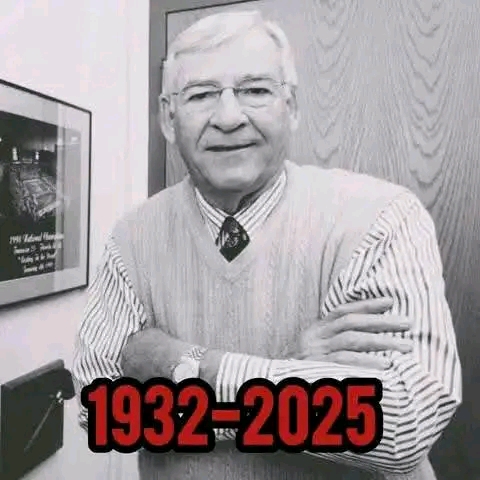Legendary Tennessee Vols Coach Doug Dickey Dies at 91: A Titan of College Football Passes On
KNOXVILLE, TN — May 6, 2025
The Tennessee Volunteers community and the broader college football world are mourning the loss of one of the game’s most transformative figures. Doug Dickey, the legendary former head coach and athletic director who shaped generations of athletes and redefined the identity of Tennessee football, has passed away at the age of 91.
His death, confirmed early Tuesday morning by the University of Tennessee, marks the end of an era for a man whose impact was felt far beyond the gridiron. From changing the aesthetic of Vol football to spearheading major facility developments and fostering a culture of excellence, Doug Dickey was a pioneer, a visionary, and above all, a leader of men.
The Early Days: A Gator Turned Vol
Born in Vermillion, South Dakota on June 24, 1933, Doug Dickey’s football journey began not in Knoxville but in Gainesville, Florida. A standout quarterback for the Florida Gators in the early 1950s, Dickey graduated with a degree in mechanical engineering. His passion for the game led him into coaching, beginning as an assistant under the legendary Frank Broyles at Arkansas and later with Darrell Royal at Texas.
But it was in 1964 that his life — and Tennessee football history — changed forever.
At the youthful age of 31, Doug Dickey was hired as the head football coach at the University of Tennessee. The Vols had been adrift in mediocrity, far removed from the golden age of General Robert Neyland. But in Dickey, Tennessee found a spark — a bold mind ready to modernize both the program and its image.
Transforming Tennessee Football: The Dickey Era Begins
From the moment he stepped onto campus, Doug Dickey sought to turn a stagnant program into a juggernaut. He introduced innovations that would become hallmarks of Tennessee football, including the iconic orange-and-white checkerboard end zones and the use of orange pants on the road — stylistic changes that are now woven into the identity of the team.
But Dickey’s legacy goes far beyond aesthetics. Under his leadership, Tennessee quickly returned to national relevance. Between 1964 and 1969, he compiled a 46–15–4 record, won two SEC championships (1967 and 1969), and brought Tennessee back into the postseason spotlight with appearances in the Bluebonnet, Gator, Orange, and Cotton Bowls.
He developed standout players such as quarterback Dewey Warren, linebacker Steve Kiner, and wide receiver Lester McClain — who in 1968 became the first African-American to play for Tennessee football, thanks in large part to Dickey’s support of integration during a time of great tension in the South.
A Leader Ahead of His Time
Dickey was not just a winning coach; he was a man who saw the need for evolution in college sports — on the field, in facilities, and in social issues. He pushed for modernization in training and infrastructure, and his support for integrating Tennessee athletics stood out during an era when many SEC schools lagged behind.
“Coach Dickey was a forward-thinker,” said Peyton Manning in a statement released Tuesday. “He helped lay the foundation for what Tennessee football would become. We owe so much to him — not just for the wins, but for the culture he built.”
In 1970, Dickey made a surprising and controversial decision: he left Tennessee to return to his alma mater, Florida, as head coach. While his coaching tenure with the Gators (1970–78) was less successful, his legacy in Knoxville remained intact. It would come full circle a decade later.
Returning Home: Doug Dickey, Athletic Director
In 1985, Doug Dickey returned to Tennessee — this time as athletic director. What followed was a nearly two-decade tenure that helped usher the University of Tennessee into its most successful era of modern athletics.
He hired or oversaw the careers of legendary coaches like Phillip Fulmer (football), Pat Summitt (women’s basketball), and Rod Delmonico (baseball). He was instrumental in expanding and renovating Neyland Stadium into the 100,000-plus seat colossus it is today, and spearheaded improvements in facilities across the university’s athletic programs.
Under Dickey’s direction, Tennessee won 10 SEC titles in football and saw unprecedented success in women’s basketball under Pat Summitt, including six national championships. His ability to recognize and empower coaching talent, invest in long-term growth, and balance tradition with progress made him one of the most effective athletic directors in the nation.
A Lasting Legacy
Doug Dickey officially retired in 2003, but his presence never faded. He remained a guiding voice in university circles, a mentor to former players, and a symbol of Tennessee’s golden era. In 2003, the National Football Foundation inducted him into the College Football Hall of Fame as a coach, cementing his legacy alongside the game’s greatest figures.
Dickey’s influence is still visible on Saturdays in Knoxville — from the iconic uniforms to the checkerboard end zones, from the packed Neyland Stadium crowds to the generations of players and coaches he shaped.
University Chancellor Donde Plowman reflected on his passing: “Doug Dickey was not just a coach or an administrator. He was an architect of Tennessee Athletics. His contributions stretch across decades and impacted thousands. We honor him today not only for what he did for Tennessee but for who he was — a principled leader and a builder of tradition.”
Tributes Pour In
The outpouring of tributes was immediate. Former players, coaches, and fans shared memories of a man they called a mentor, a disciplinarian, and a visionary.
Phillip Fulmer, who was recruited by Dickey in the late 1960s and later became Tennessee’s national championship-winning head coach in 1998, said, “Coach Dickey changed my life. He gave me my shot as a player, believed in me as a coach, and helped mold Tennessee into a program where excellence was the expectation.”
Pat Summitt’s son, Tyler Summitt, added, “My mom had immense respect for Coach Dickey. He believed in women’s athletics before it was popular to do so. He empowered her and supported her like no other AD in the country.”
Social media filled with photos of Dickey from fans wearing throwback Vols gear, tagging their posts with #ThankYouCoachDickey and #VolForLife.
A Family Man and Community Leader
Beyond football, Doug Dickey was a family man. He is survived by his wife of over 60 years, JoAnne, their three children, and several grandchildren. Friends and family describe him as humble, deeply spiritual, and devoted to mentoring young people, both in sports and in life.
He also played a major role in civic initiatives in Knoxville and Gainesville, contributing to community development programs, youth athletic clinics, and veterans’ support organizations.
Final Farewell
The University of Tennessee announced that a public memorial service will be held at Neyland Stadium later this week, with full details to follow. Plans are already in place for the Vols to wear commemorative helmet decals during the upcoming season, and the university intends to dedicate a plaza at the stadium in his name.
Flags on campus have been lowered to half-staff, and a moment of silence will be observed before all athletic events this week.
Closing a Chapter
Doug Dickey’s death is more than the passing of a coach; it is the end of a chapter in American college football. His 91 years were marked by courage, conviction, and a commitment to leaving institutions better than he found them.
He resurrected a proud but dormant Tennessee football program, revolutionized the way it presented itself, and then spent decades as an administrator building Tennessee into a national powerhouse across sports. His fingerprints are everywhere — from the end zones to the press boxes, from scholarships to national titles.
As the sun sets behind Neyland Stadium tonight, the echoes of Doug Dickey’s voice will still be heard in the cheers of the fans, the cadence of the band, and the legacy of the Vols he helped build.
Doug Dickey (1933–2025)
A coach. A builder. A Vol forever.









